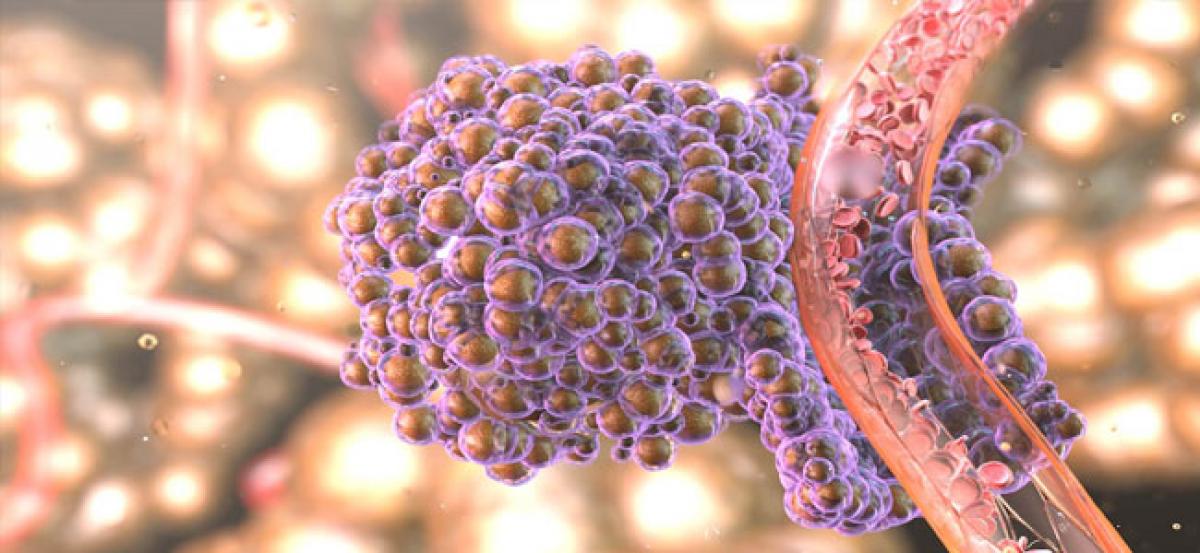Live
- Malladi Vishnu complains to EC on Naidu, Ayyanna & Pawan
- MyVoice: Views of our readers 19th April 2024
- Peddireddi touched my feet for DCC post, recalls Kiran
- All politicos must commit to free press
- iPhone 17 Plus Rumors: Potential Smaller Screen Size for the 2025 iPhone
- Risk of Middle East escalation
- 50 families quit YSRCP, join TDP
- Nara Bhuvaneshwari to File Nomination Papers on Behalf of TDP Chief Chandrababu in Kuppam
- Tamil Nadu BJP Chief Announces End Of Dravidian Politics, Foresees BJP Surge
- YS Jagan's Memanta Siddham Bus Yatra begins in Rajapuram, to enter Kakinada by evening
Just In
Scientists discover signals that trigger cancer cells proliferation


A team led by Johns Hopkins researchers has discovered a biochemical signaling process that causes densely packed cancer cells to break away from a tumor and spread the disease elsewhere in the body. In their study in Nature Communications, the team also reported that the combined use of two existing drugs disrupts this process and appears to significantly slow
A team led by Johns Hopkins researchers has discovered a biochemical signaling process that causes densely packed cancer cells to break away from a tumor and spread the disease elsewhere in the body. In their study in Nature Communications, the team also reported that the combined use of two existing drugs disrupts this process and appears to significantly slow cancer’s tendency to travel, a behavior called metastasis.
The new findings are important, the researchers said, because 90 percent of cancer deaths are caused by metastasis, and anything that derails this activity could improve the prognosis for patients. The crucial new signaling process turned up when the team took a closer look at cellular events that promote metastasis.
"We found that it was not the overall size of a primary tumor that caused cancer cells to spread, but how tightly those cells are jammed together when they break away from the tumor,” said lead author Hasini Jayatilaka, a postdoctoral fellow at Johns Hopkins’ Physical Sciences-Oncology Center.
“At a fundamental level, we found that cell density is very important in triggering metastasis. It’s like waiting for a table in a severely overcrowded restaurant and then getting a message that says you need to take your appetite elsewhere.”
Jayatilaka and her colleagues found a medication mix that kept this microscopic message from being delivered. The team members cautioned that this treatment was tested in animal models, but not yet on human cancer patients. Nevertheless, they said the discovery contributes to a promising new focus for cancer research: disrupting the biochemical activity that prods cancer cells to spread through the body.
One of the study’s senior authors, Denis Wirtz, who is Johns Hopkins University’s vice provost for research and director of its Physical Sciences-Oncology Center, said no commercial drugs are now being produced specifically to inhibit metastasis because drug companies believe the best way to stop cancer from spreading is to destroy the primary tumor from which it originates.
“The pharmaceutical companies view metastasis as a by-product of tumor growth,” said Wirtz, who also holds Johns Hopkins faculty appointments in chemical and biomolecular engineering, in pathology and at the Johns Hopkins Kimmel Cancer Center. “Our study looked more closely at the steps that actually initiate metastasis.
By doing this, we were able to develop a unique therapeutic that directly targets metastasis, not the growth of the primary tumor. This treatment has the potential to inhibit metastasis and thus improve cancer patient outcomes.”
The two key drivers of metastasis, Wirtz said, are cancer cells’ tendency to reproduce at a rapid rate and their ability to move through surrounding tissue until they reach the bloodstream, where they can then hitch a ride to spread the disease to other parts of the body.

© 2024 Hyderabad Media House Limited/The Hans India. All rights reserved. Powered by hocalwire.com






